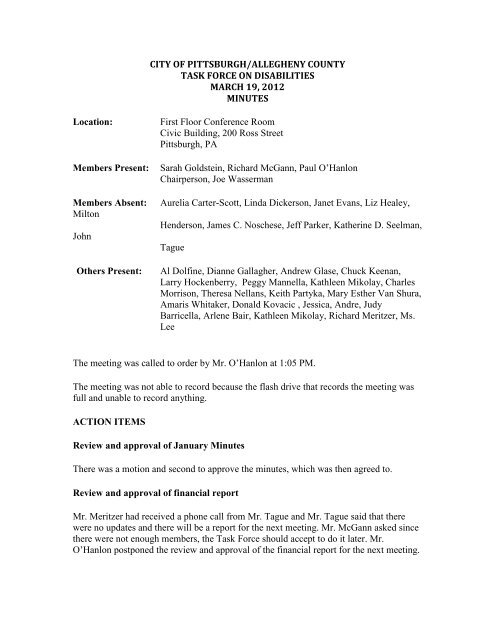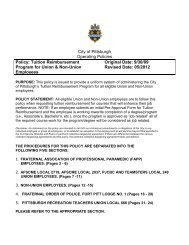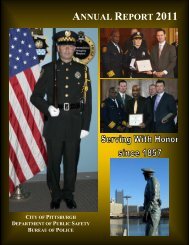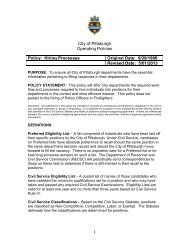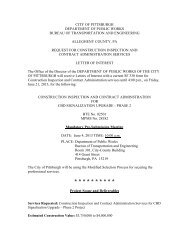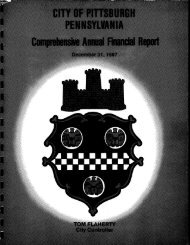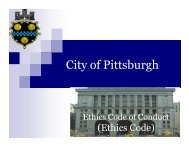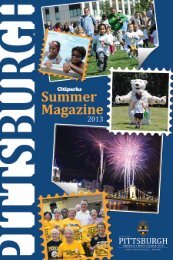CITY OF PITTSBURGH/ALLEGHENY COUNTY
CITY OF PITTSBURGH/ALLEGHENY COUNTY
CITY OF PITTSBURGH/ALLEGHENY COUNTY
You also want an ePaper? Increase the reach of your titles
YUMPU automatically turns print PDFs into web optimized ePapers that Google loves.
<strong>CITY</strong> <strong>OF</strong> <strong>PITTSBURGH</strong>/<strong>ALLEGHENY</strong> <strong>COUNTY</strong><br />
TASK FORCE ON DISABILITIES<br />
MARCH 19, 2012<br />
MINUTES<br />
Location: First Floor Conference Room<br />
Civic Building, 200 Ross Street<br />
Pittsburgh, PA<br />
Members Present: Sarah Goldstein, Richard McGann, Paul O’Hanlon<br />
Chairperson, Joe Wasserman<br />
Members Absent: Aurelia Carter-Scott, Linda Dickerson, Janet Evans, Liz Healey,<br />
Milton<br />
Henderson, James C. Noschese, Jeff Parker, Katherine D. Seelman,<br />
John<br />
Tague<br />
Others Present: Al Dolfine, Dianne Gallagher, Andrew Glase, Chuck Keenan,<br />
Larry Hockenberry, Peggy Mannella, Kathleen Mikolay, Charles<br />
Morrison, Theresa Nellans, Keith Partyka, Mary Esther Van Shura,<br />
Amaris Whitaker, Donald Kovacic , Jessica, Andre, Judy<br />
Barricella, Arlene Bair, Kathleen Mikolay, Richard Meritzer, Ms.<br />
Lee<br />
The meeting was called to order by Mr. O’Hanlon at 1:05 PM.<br />
The meeting was not able to record because the flash drive that records the meeting was<br />
full and unable to record anything.<br />
ACTION ITEMS<br />
Review and approval of January Minutes<br />
There was a motion and second to approve the minutes, which was then agreed to.<br />
Review and approval of financial report<br />
Mr. Meritzer had received a phone call from Mr. Tague and Mr. Tague said that there<br />
were no updates and there will be a report for the next meeting. Mr. McGann asked since<br />
there were not enough members, the Task Force should accept to do it later. Mr.<br />
O’Hanlon postponed the review and approval of the financial report for the next meeting.
PRESENTATION - Peggy Mannella<br />
PA Connecting Communities<br />
Peggy Mannella and Arlene Bair from PA Connecting Communities presented<br />
information about PA Connecting Communities. Ms. Mannella stated that PA Connecting<br />
Communities is an organization that provides programs, events, classes, and<br />
opportunities for people with various types of disabilities. She displayed a book that PA<br />
Connecting Communities releases twice a year listing all the activities. While the<br />
activities in the book were mainly for people with intellectual and developmental<br />
disabilities, PA Connecting Communities also offer activities for the partially blind,<br />
hearing impaired and physically disabled. Arlene passed around the book to everyone at<br />
the meeting. PA Connecting Communities have day-activity centers in Allegheny County<br />
and PA Connecting Communities is also in a six-county surrounding area. She then went<br />
into details about the activities that PA Connecting Communities provides. PA<br />
Connecting Communities offers evening educational programs, recreation and leisure,<br />
health and wellness programs, weekend bowling, one-on-one rehabilitation specialists<br />
that assist and help people going out into the community and develop skills to be<br />
independent as possible, and PA Connecting Communities has individuals on staff that<br />
provide behavioral services when needed. PA Connecting Communities is partnered with<br />
the Office of Intellectual Disabilities. They are a state funded qualified provider and they<br />
accept and bill using some different waivers and have a contract with the Office of Long-<br />
Term Living and provide service to people that have that particular waiver. They are also<br />
involved with the Highmark Walk for a Healthy Community and Arlene passed out<br />
brochures regarding the Highmark Walk.<br />
Ms. Mannella stated that PA Connecting Communities serve individuals of all ages,<br />
primarily from 16 to the senior population. They are partnered with the school districts<br />
and try to transition people from the various stages of one’s life to other stages of one’s<br />
life. She expressed her honor and gratitude for being able to speak at the Task Force<br />
Meeting. Ms. Mannella was also happy to be involved with the Task Force and PA<br />
Connecting Communities would like to become a community where needs and concerns<br />
of the disabled community could be addressed. She then opened up for questions.<br />
Mr. O’Hanlon asked Ms. Mannella who funded PA Connecting Communities. Ms.<br />
Mannella answered that PA Connecting Communities billed through waivers and they<br />
also self-pay. They also receive money through a foundation to help financially<br />
scholarship people that are in very much of need. Mr. O’Hanlon asked since PA<br />
Connecting Communities billed by waiver, did that mean individuals would have to be<br />
eligible for the waiver. Ms. Mannella responded that yes that an individual did need to be<br />
eligible depending what the needs are. Mr. O’Hanlon asked if that was people with<br />
intellectual disabilities. Ms. Mannella answered yes, and added that PA Connecting<br />
Communities is qualified to bill through any waiver.
Mr. O’Hanlon asked if PA Connecting Communities operated with organizations<br />
referring to them or did they operate by self-referral. Ms. Mannella answered that PA<br />
Connecting Communities operated in both ways of referral. She then stated the history of<br />
PA Connecting Communities. It was a grassroots organization that started in 2004. She<br />
then said they are busy and in the midst of a supportive employment program and they<br />
had received a grant from the City of Pittsburgh and the Developmental Disability<br />
Council, helping individuals seek employment through volunteering initially and<br />
hopefully getting employment for those interested. PA Connecting Communities’ main<br />
offices are in Lawrenceville and they are partnered with the Lawrenceville Cooperation.<br />
They would like to use the Lawrenceville Corridor as its model program and also have<br />
centers in the West End, Bloomfield, and neighboring communities.<br />
Mr. Wasserman asked how large the staff of PA Connecting Communities is, how many<br />
clients do they serve. Ms. Mannella responded that PA Connecting Communities have<br />
120 people on their staff and 24-30 are full-time while the rest remain part-time because<br />
they prefer to because they are retired, or have another job, or are raising a family. There<br />
is a diverse group on the staff and PA Connecting Communities hires by word of mouth.<br />
There is not much of a turnover in staff and most of the people who started in 2004 have<br />
stayed on and PA Connecting Communities offers a flexible schedule. She answered Mr.<br />
Wasserman’s second question saying that with the waiver funding they service<br />
approximately 300 people, however for the private pay for dances, evening classes, and<br />
enrichment classes they have over 3000 people and mail to around 6500 people. Mr.<br />
Wasserman asked if they classes were at Lawrenceville. Ms. Mannella responded that<br />
they are some classes at Lawrenceville and they rent other facilities, the challenge for<br />
them is transportation and they try to provide programs in communities that<br />
transportation is more accessible and more affordable.<br />
Larry Hockenberry asked if PA Connecting Communities provided information to deal<br />
with early hearing disabilities. Ms. Mannella said that they have never experienced this<br />
situation but they partner with excellent organizations that have experience and see what<br />
PA Connecting Communities can do to provide services. She added that PA Connecting<br />
Communities is a resource and they would discover the information if the situation came<br />
up. PA Connecting Communities is located on 4401 Butler Street in Lawrenceville and<br />
they are in the catty corner next to Arsenal Lanes and they are accessible by bus<br />
transportation on the 91A bus line. Ms. Gallagher answered Larry’s question that an<br />
organization for early intervention would be through the school district and you should<br />
go to a school in your neighborhood and they would give you information about early<br />
intervention.
Mr. McGann asked if there were if there is a school system that would be able to help PA<br />
Connecting Communities. Ms. Mannella answered that they partner with the school<br />
districts and transition coordinators, and maybe they provide what the school districts and<br />
transitioning coordinators cannot provide. Mr. McGann stated that deaf partnership is a<br />
difficult transition and it is confusing. Ms. Mannella agreed with Mr. McGann and added<br />
that they recently started to try to get support from the Veteran’s Administration for a<br />
grant for services for returning Veterans. They had not received the grant yet but they are<br />
hoping to get it soon so it will not be confusing and if they cannot provide services that<br />
are needed, they offer referrals to an organization that can. Mr. McGann asked if they<br />
provide services for Post-Traumatic Stress Disorder. Ms. Mannella answered that they<br />
do.<br />
Mr. Meritzer asked if the PA Connecting Communities was either available digitally or<br />
online for someone who cannot read. Ms. Mannella said that the programs were listed<br />
online at www.paconnectingcommunities.org, and if you did not see the activity on the<br />
website to call them and ask if they offer it.<br />
Ms. Goldstein asked if PA Connecting Communities offered peer support groups. Ms.<br />
Mannella answered that they do have peer support groups and advocacy groups and they<br />
have a process of teaching participants how to do for themselves. Before the dances that<br />
they have, they have training in a separate room and invite speakers to speak. Ms.<br />
Goldstein expressed that it was helpful to have peer support. Ms. Mannella stated that<br />
they are fortunate that in the Western Pennsylvania area there are many terrific non-profit<br />
organizations supporting the disabled community. Ms. Mannella agreed again with Mr.<br />
McGann that this information is confusing and it is very helpful to have peer support and<br />
advocacy groups. Ms. Goldstein asked if they advocated for utilities and housing issues.<br />
Ms. Mannella said that yes they partner with the housing community and Ms. Mannella<br />
and Ms. Bair had given presentations on how other people can assist the process of<br />
referrals and resources.<br />
Mr. Hockenberry asked if PA Connecting Communities was involved with Highmark.<br />
Ms. Mannella answered that yes they were involved with Highmark. He then asked if Ms.<br />
Mannella had heard about the event of the 19th with people from Hawaii coming to Saint<br />
Paul and said that Highmark provides support for the oral school there and PA<br />
Connecting Communities should take advantage of getting money from Highmark. Ms.<br />
Mannella stated that they are always looking for financial report and she will further look<br />
into that. Mr. Hockenberry disagreed with the DePaul School. Ms. Gallagher understood<br />
Larry’s feelings, but she said that the DePaul School is for the deaf is still for the deaf<br />
that need help. Mr. O’Hanlon stated that this discussion was not about the DePaul<br />
School.
Ms. Goldstein inquired about the May 19th event, young girls walking for self-esteem<br />
and wondered if it was being organized by Saint Margaret’s Hospital or Magee-Women’s<br />
Hospital. Ms. Mannella answered that they event probably received funding through the<br />
Women and Girls Foundation. Ms. Goldstein asked if PA Connecting Communities is<br />
working on the Girls on the Run event. Ms. Mannella responded that they were not<br />
working on that event, but on May 19th at Heinz Field there is a walk that is a walk to<br />
support with people with disabilities and PA Connecting Communities will be there<br />
networking with other non-profit groups.<br />
Mr. O’Hanlon stated that one of his missions in is to get state funded disability<br />
organizations to help with voter registration and he asked how PA Connecting<br />
Communities were helping people register to vote. Ms. Mannella responded that they are<br />
civically minded and they bring in voter coalition groups during events to register people<br />
and teach them how to vote. She says the recording of who is registered maybe through<br />
an organization.<br />
PRESENTATION<br />
311/911 Meeting - Richard McGann and Theresa Nellans<br />
Mr. Meritzer introduced this presentation about the inaccessibility at the 311 and 911<br />
office for people with hearing issues. Mr. Meritzer finally had put together a meeting<br />
with the City 311 and County 911 to discuss the issues and it was very productive. Mr.<br />
McGann, Ms. Nellans, and Mr. Noschese attended the meeting, but Mr. Noschese could<br />
not attend the meeting so the presentation was given by Mr. McGann and Ms. Nellans.<br />
Ms. Nellans had numbered points of the meeting and presented them. The first point was<br />
that when a person who cannot hear speaks to 911 and the location is not available from<br />
the land-line phone, the person outside the City of Pittsburgh must state the township<br />
where they pay their taxes. Since stating an area like Gibsonia covers several township’s<br />
police and fire departments. The second point was that anyone visiting or working in<br />
Pittsburgh can call 311. The third point was that people using the relay of TTY may need<br />
to call 412-255-2927 instead of 311; the reason is because that 311 do not work for some<br />
relay services. This number only works in Allegheny County. The fourth point was that<br />
people who are disabled should notify their local police and fire departments that they are<br />
deaf, deaf-blind, or hard of hearing; and they should explain if they use captioning,<br />
writing, or an interpreter for communication. The fifth point was if a person has a hearing<br />
loss and is using video relay or captioned telephone that service will be kept on when<br />
emergency services arrive. The sixth point was a discussion on how to request<br />
information with people who have a hearing loss; many no longer have a telephone where<br />
a form could be placed. The seventh point of the meeting was a discussion on how to<br />
inform the population with hearing loss and other disabilities about 311, 911, 211, and<br />
other numbers that may not work with other equipment so the ten-digit number is needed.
Mr. O’Hanlon inquired about what the form was in the sixth point of the meeting. Mr.<br />
Meritzer answered that in the past an individual could fill out a form for emergency<br />
services that told emergency services what assistance was needed, but this form is no<br />
longer available. Mr. Meritzer assumed that this was just a discussion on what can be<br />
done, but there was no real answer yet. Mr. McGann agreed with Mr. Meritzer and added<br />
that there should be a database so people can gather information in one spot so in an<br />
emergency the right accommodations can be provided.<br />
Ms. Nellans continued with the eighth point of the meeting which was no one type of<br />
equipment or interpreter works with hearing loss. The ninth point was that progress is<br />
being made on the GPS 911 in cell phones. The tenth point was as a result of the 21st<br />
Century Communication and Video Access Act; the FCC established a five-step action<br />
plan called Next Generation 911. This plan is to enable for people to send text, photos,<br />
and videos to public safety answering points. For the eleventh point it is recommended<br />
that 911 ask: Do you need help with your communication? 911 is not to use the word<br />
accommodation because it is not generally known and could be confused. The twelfth<br />
point was that a handout of questions for 911 operators to ask during voice carry over<br />
calls was provided.<br />
Mr. Wasserman asked Ms. Nellans about the 211 and asked what the number was used<br />
for. Mr. Meritzer answered and said that he believed that 211 was a number for social<br />
services other than and emergency and it was used as a referral line, but it was the one of<br />
the most underutilized services provided.<br />
Mr. O’Hanlon asked if a deaf person who does not use speech on the phone can text 911<br />
in an emergency. Mr. Wasserman also asked if that would be available next year, or when<br />
is it planned for. Mr. McGann answered that he thinks they need to work on the<br />
guidelines on how to use 911 services so that the deaf, deaf-blind, and hard of hearing<br />
community know how to use them and then make the connection to text 911. Mr.<br />
O’Hanlon further inquired if there was a capacity to text 911 and if there is an<br />
approximate date when it will be ready. Mr. Meritzer responded that they are working on<br />
the capacity to text 911, and said the plans were part of the new regulations and it is on<br />
the 311 and 911 agenda, but right now they are working to making it more seamless with<br />
people that use videophones. Mr. McGann stated that with the technological are<br />
improving and we need to take advantage and improve the services. Mr. McGann asked<br />
Ms. Nellans and Ms. Gallagher if it was possible to get an email or copy of the list. Mr.<br />
Meritzer told Ms. Nellans she can email it to him and Mr. Meritzer would get them out.
Mr. O’Hanlon asked if there was any plan for 311 or 911 to do training with the deaf,<br />
deaf-blind, or hard of hearing community about how to interact with members of that<br />
community, and what would be the best practices at this time. Mr. Meritzer said that<br />
nothing about training came up at the meeting, but they could request that and 311 and<br />
911 are very open. Mr. O’Hanlon asked if the public in the deaf and hard of hearing<br />
community would be interested in assisting in that training. Ms. Nellans and Mr.<br />
Hockenberry were both interested in that opportunity. Mr. O’Hanlon wondered if they<br />
could contact the FCC and work with them to make 911 more seamless. Mr. Wasserman<br />
suggested that they could start working with the local 911. Mr. O’Hanlon stated that they<br />
could start with local training and then explore who to reach out in the FCC. Mr. McGann<br />
added that Mr. Noschese had asked about training later in the meeting and was willing to<br />
help plan and do everything that was necessary for training. Mr. McGann also thought it<br />
would be important for 911 to see the emergency that is happening and set up an<br />
interpreter for that situation. Mr. McGann also thought that having an interpreter training<br />
program is a wonderful idea.<br />
Mr. O’Hanlon was still curious about the form the people filled out for accommodations<br />
in the past. Mr. Meritzer said that they were utilized in some areas, maybe not Pittsburgh,<br />
to collect information. Mr. Meritzer also added the City and County 311 and 911 offices<br />
need one database. Mr. Meritzer said that the question for them was how to develop that<br />
database and they are looking at something so that everyone has access to and is safe<br />
filling it out. Mr. McGann agreed that is what is needed for the database. Donald Kovacic<br />
described a situation where a deaf person noticed a problem in the City and they get<br />
home and use a video phone to call 911 and they are stuck, the individual asked how to<br />
improve the 311 system so they can access a person where they are. Mr. Meritzer<br />
answered that the ten digit number for 311 works everywhere and they had discussed<br />
getting the ten digit number out for 311 and 911. Mr. Meritzer mentioned that Mr.<br />
Thomas said the video phones work fine with the ten digit number. Mr. Kovacic gave<br />
another example of a tree falling in your neighborhood and you did not want to call the<br />
police of paramedics, you can call the ten digit number anywhere in Allegheny County<br />
and get the word out that a tree has fallen. Mr. O’Hanlon remembered that in the past<br />
there had been an effort to identify households that individuals lived at that had mobility<br />
difficulties. Mr. O’Hanlon suggested that having a database of broad range would be<br />
useful to collect information on individual households that have a particular need. Mr.<br />
O’Hanlon inquired whether there is a broad effort possible or needed, then simply<br />
identifies the deaf and hard of hearing households and is there any broad coordinated<br />
effort to do that. Ms. Goldstein asked if you could get that information through the<br />
Census. Mr. O’Hanlon responded that information was probably not available. Mr.<br />
Meritzer said that the Task Force can make the request for that information.<br />
Mr. O’Hanlon asked if the form to fill out was in place and he had just not heard of it.<br />
Mr. Meritzer added the issue was how to get the word out about the form. Mr.<br />
Wasserman suggested a public service announcement telling every agency that deals with<br />
the disable and every client that has a responsibility.
Ms. Goldstein expressed her fears that her older friends that she looks after, she cannot<br />
get in touch with them at some times because the leave the phone off the hook by<br />
accident. Ms. Goldstein suggested that the way they find out information about these<br />
people in a pleasant and kind way, for example in case of a natural disaster. Mr. McGann<br />
thanked Ms. Goldstein for bringing that issue up and added that people know to call 911<br />
and 411 but they do not know about any other numbers. Mr. O’Hanlon said that it had<br />
occurred to him that in this era with the internet, it is much easier to input information<br />
about their special needs. Mr. O’Hanlon realizes there are privacy issues, but he feels<br />
with a lot of effort put in that it is doable.<br />
Mr. Keenan informed everyone that on the side of most large apartment buildings and<br />
commercial buildings there is a lock box for emergencies and the lock boxes have master<br />
keys and any information that the fire department needs to know. Mr. Keenan suggested<br />
that idea could be done for small residential properties, but maybe electronically.<br />
Mr. Hockenberry told a story he saw on Facebook that in another state, a neighbor heard<br />
moaning from a house next door and saw that their neighbor had fallen. The neighbor<br />
tried the door but could not get in so they had to break in and call 911. The neighbor was<br />
arrested for breaking and entering. Everybody in the room had a little laugh.<br />
DISCUSSION<br />
Makeup of the Task Force<br />
Mr. O’Hanlon started to discuss that there are two possibly more openings on the Task<br />
Force and the Task Force is starting to think of a process to identify who is a City<br />
appointee and a County appointee, then identify suitable candidates for the openings in<br />
the Task Force. Mr. O’Hanlon asked if there should be a subcommittee set up to find a<br />
replacement. Mr. O’Hanlon added that Ms. Healey would like to see a person with an<br />
intellectual disability be a replacement for her. Ms. Gallagher asked if there is a certain<br />
area that the Task Force would want to hear from that is not involved. Mr. O’Hanlon<br />
answered that yes, the Task Force did need to look at the gaps of not having someone<br />
with an intellectual disability on the Task Force. Mr. McGann asked whether the Task<br />
Force is looking for a representative from a group or someone with a disability. Mr.<br />
O’Hanlon said that Ms. Healey filled the role of a person with a particular interest with<br />
people with intellectual disabilities, and the role of a parent. Mr. O’Hanlon further said<br />
that if the Task Force replaces Ms. Healey with someone with an intellectual disability<br />
the Task Force would lose a parent representative. Mr. McGann agreed that the opening<br />
should be filled by a parent. Mr. O’Hanlon said that Ms. Healey thinks it is time to get<br />
someone with an intellectual disability and she did not want it to be a parent. Ms.<br />
Goldstein said she was thinking about having both a mother and son sit on the Task<br />
Force. Mr. O’Hanlon said that is something that can be entertained. Mr. Wasserman<br />
asked if there is a possibility of having a manager or superintendent of an organization<br />
that helps the intellectually disabled on the Task Force. Mr. O’Hanlon answered that he<br />
did not know if there is a restriction on who can be on the Task Force. Mr. O’Hanlon<br />
questioned what kind of process of selecting new candidates. Mr. O’Hanlon said one<br />
possibility was a subcommittee, and another possibility was an executive committee that<br />
could come up with recommendations.
Ms. Lee asked because she was not a resident of Pittsburgh but she lived in Monroeville<br />
did that disqualify her from being a candidate for the Task Force. Mr. O’Hanlon<br />
answered that the Task Force is looking for people living with the City and the County,<br />
so Ms. Lee living in Monroeville did not disqualify her.<br />
Mr. McGann suggested that there be a subcommittee to find replacements. Mr. O’Hanlon<br />
asked who to identify for the subcommittee. Mr. Wasserman asked who was on the<br />
interview team that interviewed him four years ago. Mr. Meritzer said he collected the<br />
resumes and Ms. Healey set up the interviews with groups they needed had to be filled.<br />
Ms. Goldstein added that it would be a good idea to set up the process through an<br />
executive committee. Mr. O’Hanlon stated that the executive committee was himself, Ms.<br />
Seelman, Mr. Tague, and Mr. Noschese. Mr. O’Hanlon said he will solicit the executive<br />
committee and organize a search committee and get back to the Task Force with a plan or<br />
report.<br />
Larry added that he did not agree last meeting when Ms. Nellans said she had more<br />
experience working with the deaf then Ms. Gallagher.<br />
STAFF REPORTS<br />
Mr. Meritzer stated that the ADA office was very busy then turned it over to his<br />
assistants to discuss some of the projects they are working on. Mr. Meritzer apologized<br />
for not getting the ADA Strategic Planning Meeting minutes out digitally.<br />
Mr. Partyka discussed what had been discussed at the Strategic Planning Meeting. Mr.<br />
Partyka said that Mr. Meritzer was passing on the Zoomtext software and Ms. Mikolay<br />
has met with a company on accessible alternative to sidewalk barricades. Mr. O’Hanlon<br />
asked what is meant by a sidewalk barrier. Mr. Meritzer responded that barricades are<br />
when the sidewalks are closed and the company contacted has alternative barricade<br />
systems that are ADA compliant. Mr. O’Hanlon asked if sawhorses are barricades and<br />
Mr. Meritzer responded that they are not accessible. Mr. Meritzer said the company has<br />
little wall like barricades that are mostly solid and go up to a person’s waist and have soft<br />
material that can have verbal warnings printed on them. Mr. O’Hanlon asked since he<br />
encounters sawhorses frequently, if there is a way to have a construction notice without<br />
having the sawhorse in the way. Mr. Meritzer answered that the Task Force may want to<br />
have the Penn Dot construction office in Bridgeville come in and talk with them about<br />
that.<br />
Mr. Meritzer then directed everyone’s attention to the back of the room where there was a<br />
blue sign with white writing and it said “Rock & Roll” and someone with a white cane<br />
and someone in a wheelchair. Mr. Meritzer said the signs were being given away as door<br />
prizes at MovePGH meetings. Mr. Partyka gave credit to Mr. Meritzer for coming up<br />
with the design for the sign.
Mr. Partyka then said the ADA office was looking at contractors for 5 to 7 minute<br />
television spots on the cable channel and the internet. Mr. Meritzer added hopefully they<br />
will find a contractor soon, and Mr. Wasserman will be the next guest on a television<br />
spot. Mr. Partyka added that they are drawing up guidelines for service dogs. Ms.<br />
Goldstein said that her friend in Arizona has a dog that is trained for psychiatric services<br />
and Mr. Meritzer said that dog would be a service dogs because it has a specific function.<br />
Mr. Meritzer added the ADA office is drawing up clear language for service dogs.<br />
Mr. Partyka then said he and Mr. Meritzer were looking at picture communication boards<br />
for EMS and wheelchair vans for police and EMS and they are looking for the funding.<br />
Mr. Partyka then discussed how he and Mr. Meritzer had been working with the Aquatic<br />
division to make Schenley, Highland, Sue Murray, Oliver Bathhouse, and McBride pools<br />
accessible. Mr. Partyka added that those pools were selected based on ACCESS<br />
demographics and other factors in the pool facilities such as restrooms and public<br />
transportation.<br />
Mr. Partyka said the final thing that the Strategic Planning Committee discussed was the<br />
natural amphitheater at the Environmental Center at Frick Park. Mr. Partyka said he and<br />
Mr. Meritzer were working with the Pittsburgh Parks Conservancy on different options<br />
for the accessible routes to the amphitheater. Mr. O’Hanlon inquired where the<br />
amphitheater was. Mr. Meritzer answered that the amphitheater is being built at the<br />
Environmental Center that burned down at Frick Park. Mr. Meritzer and Mr. Partyka<br />
negotiated with the Conservancy that they would provide accessibility when the building<br />
is open, but it would not be responsible when the building is not open. Mr. Meritzer<br />
added that the current trail to the amphitheater is not accessible. Mr. O’Hanlon asked for<br />
pictures of the amphitheater. Mr. McGann asked Mr. O’Hanlon if a building cannot<br />
afford to renovate is it against the ADA. Mr. O’Hanlon answered if it is an undue burden<br />
there’s an indirect cost consideration and ability to pay consideration within the ADA.<br />
Ms. Whittaker discussed the One-Step Program and she is meeting with architectural<br />
firms and persuading them to do the required drafts for pro bono or a reduced cost. She<br />
was going to meet with VAF Architecture, Peter Maggitatti, Farkas Associates, and Next<br />
Architecture. Once an architectural firm agrees, they will roll out the packet and do more<br />
publications as more firms agree. Mr. McGann asked why they want to make it one-step.<br />
Ms. Whittaker answered that there are older buildings in Pittsburgh that were built before<br />
ADA regulations and businesses are not required to change the front of their businesses.<br />
Mr. Meritzer added in the past the one-step was used in businesses to keep dirt out. Ms.<br />
Whittaker then discussed the four parts of the packet: the first part states that it is an<br />
ADA regulation and if the business does not comply they can be sued. The second part<br />
states what steps the business has to take to be updated. Part three is grants and tax<br />
credits, and the fourth part is where the architectural ads will be in the area and work<br />
cited and other resources about building codes. Mr. McGann congratulated Ms. Whittaker<br />
for putting this plan forward.
OTHER COMMENTS<br />
An unidentified male announced that the Allegheny County Housing Authority has<br />
opened up the section 8 waiting list and it is open until the end of the month.<br />
Mr. Wasserman asked if the Task Force was going to meet with the Pittsburgh<br />
Downtown Partnership and discuss the bus stop issue. Mr. O’Hanlon agreed that the Task<br />
Force should. Mr. Wasserman also inquired if the Task Force should meet with the<br />
Mayor since it has been over a year. Mr. O’Hanlon answered that he sensed a higher<br />
priority was meeting with the Chief Executive about Port Authority but he agreed that<br />
they need to keep pressure on the bus stops that were cut. Mr. Meritzer stated he was<br />
trying to get a meeting with the Pittsburgh Downtown Partnership and the Partnership has<br />
been resistant and do not understand the issue of accessibility and what to work with Mr.<br />
Meritzer on. Mr. O’Hanlon sensed that the Task Force should go around them and go to<br />
Port Authority directly.<br />
Mr. Wasserman made a motion that the meeting be adjourned, Mr. McGann seconded<br />
that motion. The meeting was adjourned at 3:00 PM<br />
THE NEXT TASK FORCE MEETING<br />
DATE: April 16, 2012<br />
TIME: 1:00 P.M.<br />
LOCATION: Large Conference Room<br />
Civic Building, 200 Ross Street


